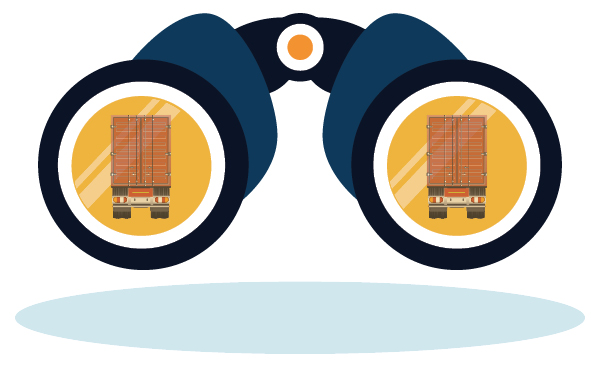What spot shortage do you predict next?

Good luck finding a truck!
—Lindsey Shellman
Chief Commercial Officer
Centerboard
Your favorite beer. Aluminum and cardboard shortages have been discussed, but little is mentioned about the knock-on effects like AB InBev/MillerCoors buying up most available supply, resulting in microbreweries struggling to package their product.
—Jason Murray
Co-founder and CEO
Shipium
Parts in general. It seems like any time something breaks, from refrigerators to pool equipment, replacement parts are all on backorder. The fact that the shortages are so widespread speaks to the fragility of our "just in time" supply chain today. I expect PPE and other medical supplies will suffer shortages next. Not to mention a shortage of healthcare workers who are leaving the profession due to burnout.
—Belinda Rueffer
Director of Marketing
Axele.com
The ongoing shortage of semiconductors and chips will result in a global shortage of electric cars, as electric car manufacturers will lack semiconductor components. Companies like Arrival, producing electric buses in the UK, or electric truck manufacturer Rivian, supported by Amazon and Ford, are already experiencing difficulties in the supply chain. Arrival’s capitalization has dropped by 150% and Rivian has postponed the supply of its electric pickup twice already.
—Dmitri Fedorchenko
CEO and Co-Founder
Doft
The path of product shortages is similar to the path the virus has followed in some ways. It’s now shifting to more discretionary products that businesses tend to keep smaller amounts of, like clothes and furniture. We’ll see the same products impacted as we head into the holiday season.
—Lior Elazary
CEO and Co-Founder
inVia Robotics
Talent is the biggest shortage we should be worried about. A mixture of demographics, the need for changing skill sets, and perception/PR of logistics roles have conspired to create a talent crisis within our industry. I worry about the needed talent to ensure all goods flow without (additional) shortages.
—Neil Wheeldon
Chief Strategy & Innovation Officer
BDP International
I don’t think there will be a shortage like we saw with toilet paper, but they are happening. Ocean containers, space on vessels, and transportation capacity in general are historically difficult to secure. What will probably happen is a shortage of domestic flights due to the Delta variant. Airlines are suffering and I’m guessing they will start to park aircrafts soon.
—Chris Peckham
VP, Operations
FreightPlus
We’ll see continued shortages that impact logistics, including plastic packaging, shipping pallets, and other products that are instrumental to moving goods globally. The days of "Black Swan" events in terms of supply shortages are long gone. Business disruptions are now the norm and not the exception.
—Jennifer Bisceglie
CEO
Interos
High-tech components are next. Toilet paper was the oddest shortage. The pandemic caused panic-buying from a fear of food or disinfectant/paper products running out for families. People would think there were shortages, but panic-buying meant that stores could not keep up with typical turnover rates with the worker shortage.
—Reo Hatfield
VP, Business Development (LTL)
TA Services
Medical facilities are short on a range of supplies, and this could only get worse. Shortages of masks and gloves from the early days of the pandemic have spread to many other medical items in the United States and Europe, from exam tables and heart defibrillators to crutches and IV poles.
—Adhish Luitel
Industry Analyst, Supply Chain Management and Logistics
ABI Research
The industry continues to face shipping capacity shortages, alongside accelerated consumer demand. As China and Thailand face congested ports and COVID lockdowns, we’ll continue to see shipping delays and potential shortages of goods such as coconut, rubber, and other products from those regions.
—Mark Robinson
President
UPS Capital
Expect spot shortages in industries and manufacturers that remain impacted by COVID and restrictions as labor constraints continue to grow. It’s important teams get ahead of the impact by maximizing efficiencies in the processes and people they have in place while planning for ongoing impacts in the future.
—Alex Wakefield
CEO
Longbow Advantage
We have the perfect recipe for a grocery supply chain crisis. Retailers are still feeling the residual effects of post-lockdown challenges. Layer into this reality global issues such as closed borders, import and supplier challenges, extreme weather, and now, the natural gas shortage.
—Patty McDonald
Head of Solution Marketing Symphony RetailAI
Christmas presents. To avoid a "Nightmare Before Christmas," retailers should be placing holiday orders for Chinese-made products earlier this year. If not, a global shipping backlog could mean shortages. You don’t want to be the little boy or girl that Santa Claus forgot.
—Richard Howells
VP, Solution Management for Digital Supply Chain
SAP Ariba
Order your holiday gifts early this year. Looking back, semiconductor shortages this vast have surprised me the most. They are so integral in almost every aspect of modern life, you would think we would protect the ability to produce them on demand.
—David Spencer
Director of Business Intelligence
Arrive Logistics
We have been driving our supply chains to be lean and just-in-time. That works fine when your environment is relatively stable, but what happens when disruption impacts both your supply—inventory dries up—and you encounter unpredicted spikes in demand? Supply chain leaders need to understand that running too lean saves working capital, but also creates vulnerabilities to shortages.
—Guy Courtin
VP and Industry Principal, Retail
Tecsys
Anything can happen as we’ve seen interruptions ripple out in previously unforeseen ways. Spot shortages of a few obscure components led almost all major auto manufacturers to slash production forecasts by double-digit percentages this year, which is indicative of just how intricate and fragile the global supply chain is.
—Danny Ramon
LE Connect Manager
Overhaul
Have a great answer to a good question?
Be sure to participate next month. We want to know:
What’s the most challenging time-critical shipment you ever pulled off? How?
We’ll publish some answers. Tell us at [email protected] or tweet us @ILMagazine #ILgoodquestion.
